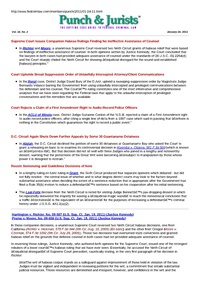Here the Court upheld a sweeping suppression order by a Magistrate Judge barring the Government from using unlawfully intercepted and privileged communications between the defendant and his counsel that went far beyond the scope of the wiretap order.
This lengthy decision involves a rare successful challenge to a …
Here, over the strong dissent of three judges, the Court declined the petition of some 30 detainees at Guantanamo Bay who asked for an en banc review of the Court's its controversial decision in Kiyemba v. Obama, 561 F.3d 509 (“Kiyemba II”).
In its landmark decision in Boumediene …
Here a divided en banc court debated, but did not fully resolve, the issue of whether and to what extent a district court may consider factors beyond substantial assistance in ruling on a Government motion for a sentence reduction pursuant to Rule 35(b).
In U.S. v. Grant, 567 …
This is an interesting case in which the American Civil Liberties Union of Illinois (herein the “ACLU”) sought to affirm a First Amendment right to audio-record conversations of police officers without their consent.
As part of its activities in deterring and detecting police misconduct, the ACLU developed a program …
This is one of those supremely silly (but highly entertaining) Guidelines’ decisions in which grown-up judges actually took some 8,000 words to debate whether a traffic “citation” constitutes an “arrest” within the meaning of the pre-2007 version of U.S.S.G. § 4A1.2(a)(2), for the purpose of calculating the defendant’s correct …
Harrington v. Richter, 131 S.Ct. 770 (Jan. 19, 2011) (Justice Kennedy)
Premo v. Moore, 131 S.Ct. 733 (Jan. 19, 2011) (Justice Kennedy)
In these companion decisions, a unanimous Supreme Court reversed two Ninth Circuit habeas decisions, one from California (Richter v. Hickman, 578 F.3d 944 (9th Cir, Aug. 10, …
Here, after sharrply chiding the Ninth Circuit for showing “judicial disregard for the sound and established principles," the Coiurt unanimously reversed a habeas grant based on ineffective assistance of counsel even when based on a summary dispositions.
Harrington v. Richter, 131 S.Ct. 770 (Jan. 19, 2011) (Justice Kennedy)
…
